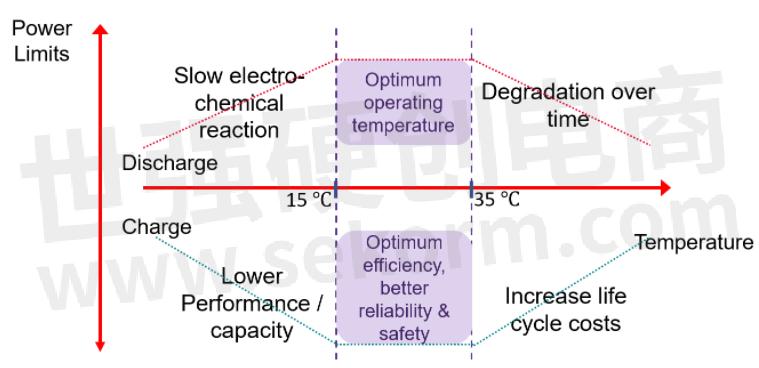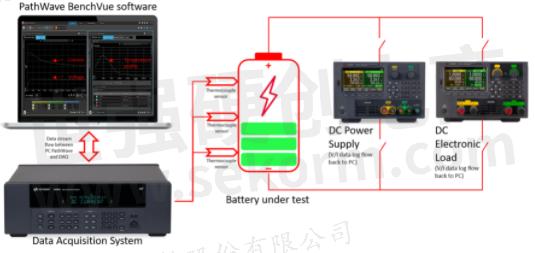Monitor Battery Temperature By Using a Data Acquisition System or Specialized Keysight Scienlab Battery Test System





In today’s electronics applications, batteries power nearly all of our portable electronic devices. Batteries also serve as emergency power backup systems on large premises. All-electric vehicles use large cascading battery packs to meet the expected power for the required performance. Battery packs need the required specific power (W/kg) to be able to dispense enough current to achieve the electric vehicle speed performance. They also need the required specific energy (Wh/kg) to achieve longer runtime or travel range.
Why is it important to monitor battery temperature?
Most rechargeable batteries today use lithium ion and have an operating range between 15 °C and 35 °C at which their full performance and capacity kicks in.
· If the battery operating at an ambient temperature below 15 °C, you may experience sluggish electrochemical reactions within the battery and as a result, lower battery performance and reduced charge capacity.
· If the battery or battery pack operates above 35 °C in ambient temperature, battery degradation can accelerate over time. As a result, you may notice shorter battery life, non-uniform aging due to thermal gradients, greater exposure to safety issues, and higher life cycle costs. At extremely hot temperatures, batteries can break down and cause leakage, smoke, fire, and even explosions.
The power map chart below shows the power limits of your lithium-ion battery cell, module, or packs across the temperature range. The range between 15 °C and 35 °C is the optimum operating temperature range for the batteries to achieve full performance. The temperature range is also the most efficient, reliable, and safe range for battery operation.

Figure 1. Power map chart shows the power limits of your battery or battery pack across temperature range (Source from Kandler Smith, NREL milestone report, 2008)
When to use a data acquisition (DAQ) system for monitoring battery temperature
A data acquisition (DAQ) system is one of the most versatile instruments to measure the temperature of physical objects or multiple objects. A DAQ system monitors temperature at multiple points in a product’s battery system. Typically, you initially test functional design blocks independently, and then you test sub-integrated design blocks during a product design and development stage. Testing for lab battery packs and systems occurs during an early product design cycle using several common R&D lab instruments.
A DAQ system can be used to monitor temperature at multiple points in a product’s battery system. Charge the battery system with a DC power supply and use a DC electronic load to discharge the battery system. Figure 2 below shows a common lab setup using a DAQ system.
If you happen to own a bidirectional DC power supply that can source and sink current, then you can replace the separate DC power supply and DC electronic load with a bidirectional DC power supply.

Figure 2. Lab test setup for product battery system test using a DAQ, DC power supply, and DC electronic load
Using Keysight’s PathWave BenchVue software application, you can quickly set up and execute tests and get results faster. The application’s test flow feature allows you to build automated tests and reduces test development time significantly. The test flow feature also enables the simple sequencing of instrument settings and measurements, and combines multiple instruments to help you create your own automated test.
PathWave BenchVue software allows you to:
· Test the battery management system in your devices by varying the charging sources and discharging the electronic load while monitoring the temperature and behavior of your battery system.
· Perform multiple temperature point measurements to evaluate cell-to-cell temperature variations.
· Set alarm triggers to monitor temperature, voltages, or currents if they go above or below acceptable limits.
When to use a specialized battery test system for monitoring battery temperature
Performing quick workarounds on bench test instruments may serve you well for quick troubleshooting and verifying your battery system design. However, when you need a dedicated and well-supported specialized battery test system, Keysight’s Scienlab battery test systems provide reliable and precise testing of battery systems whether they are in the cell, module, or at the pack level. Figure 3 below shows how Keysight Scienlab battery test systems are scalable from individual stand-alone solutions, to fully integrated test systems and ready-to-use test laboratories.

Figure 3. Keysight Scienlab battery test system
The Scienlab SL1000A series battery pack test system for example, is scalable up to 1000 V, ± 2400 A, and ± 360 kW. The battery test system is suitable for various energy storage applications ranging from automobile transportation, to industrial and other large on-premise use cases.
The Keysight Scienlab SL100XA series battery test system offers many features that make it a standout in the market. The system comes with integrated test environments for your device under test (DUT) such as temperature and climate chambers, conditioning for your DUT, and standardized contacting systems and integration to your DUT. There are also built-in safety and security mechanisms to help you avoid potentially hazardous situations.
Summary
Monitoring battery temperature occurs throughout the battery system’s product life cycle. During the early stages of the product life cycle, engineers can quickly troubleshoot and validate their battery system designs with bench instruments such as a DAQ, in conjunction with a current sourcing and sinking DC power supply. During the characterization and qualification stages of the product life cycles, the Keysight Scienlab battery test solution becomes invaluable to help you ensure a precise and volume scalable test solution.
- +1 Like
- Add to Favorites
This document is provided by Sekorm Platform for VIP exclusive service. The copyright is owned by Sekorm. Without authorization, any medias, websites or individual are not allowed to reprint. When authorizing the reprint, the link of www.sekorm.com must be indicated.
Recommend
A Deeper Look at Lithium-Ion Cell Internal Resistance Measurements
2022-06-13 - New Product Introduction This blog gives a deeper look at lithium-ion cell internal resistance measurements, then introduces one example of where Keysight provides EIS measurement capabilities in our Scienlab SL100xA series battery test systems for cell level testing.
Keysights Scienlab Battery Test Solution Tests Batteries Economically and Efficiently
2021-03-19 - Manufacturer News Recently, ElringKlinger AG, a global leading developer of automotive drive systems and volume manufacturer for battery components, decided to collaborate with Keysight2 to further accelerate the development of batteries. Their aim is to deliver highly efficient and reliable battery systems to their customers in a fast, consistent, and cost-efficient way.
Advancing the E-Mobility Ecosystem
April 3, 2023 - Supplier and Product Introduction
EP1150A,SL1800A,SL1700A,BT2200,SL1550A,PD1550A,RP7900,SL1040A,SL1041B,SL1010A,SL1001A,SL1200A,SL1047A,EV1003A,SL113XA,PV8900,EV2000,BT2152B,SL100XA
SL1091A Secure and Precise Testing of Battery Management Systems
November 1, 2018 - Supplier and Product Introduction
SL1091A
查看更多版本Investing in EV Battery Testing — Benefits for EV Battery Designers
July 3, 2023 - White Paper
SL100XA SERIES,SL1700A SERIES,SL1700A,L113XA SERIES,L113XA,SL100XA
SL1091A Scienlab Energy Storage Discover DATA SHEET
October21, 2021 - Datasheet
SL100XA SERIES,SL106XX,EP1150A,SL113XA SERIES,R-09S-036-A,R-09S-024-A,R-09S-012-A,SL1091A,SL1091A-1FP,SL106XX SERIES,SL1132A,SL1133A,SL1000A,PS-S40-02,SL1003A,SL1002A,SL1005A,SL1004A,SL113XA,SL1007A,SL100XA
E-Mobility: Innovative Design & Test Solutions for the Electric Powertrain and HEV/EV Ecosystem
October 21, 2019 - Technical Documentation
SL1001A,SL1000A,SL1003A,SL 1005A,SL1002A,SL1004A,SL1006A
SL1132A Scienlab Battery Test Solution DATA SHEET
November 2, 2020 - Datasheet
EP1150A,SL1132A-A01,HS0002A-100,SL1132A-S11,SL1091A,SL1132A-S01,R9001A-201,SL1132A-S02,SL1132A-001,PS-XPS-100,R9001A-202,SL1132A,SL1000A,SL1050A-S07,SL1050A-S06
Scienlab Energy Storage Test Systems SL1000A SL1001A SL1002A SL1003A SL1004A SL1005A
n USA, March16, 2020 - Technical Documentation
SL1001A,SL1000A,SL1003A,SL1002A,SL1005A,SL1004A
SL1000A Scienlab Battery Test System: Pack Level –Up to 180 kW
December 2, 2022 - Datasheet
SL1000A-D03,SL1000A-D00,SL1000A-D01,SL1000A-M01,SL1000A-001,SL1000A-501,SL1000A-402,SL1000A-502,SL1000A-403,SL1000A-401,SL1000A-503,SL1000A-404,SL1000A-701,SL1000A,SL1000A-504,SL1000A-50X
How to Electrify Aerospace and Defense with State-of-the-Art Design and Test Solutions
August 1, 2022 - Supplier and Product Introduction
BT2205A,EP1150A,BT2200,BT2203B,SL101XA SERIES,SL104XX SERIES,RP7900,SL1040A,SL1133A,SL1000A,SL1200A,SL1002A,SL1004A,SL1006A,PA2200,BT2152B,SL106XX,SL104XX,RP7900 SERIES,BT2204B,SD1000A,BT2202A,PA2200 SERIES,PD1500A,SL1091A,SL106XX SERIES,BT2200 SERIES,SL1132A,SL1001A,SL1047A,SL1003A,PA2203A,SL1005A,PA2201A,BT2155A,SL1007A,SL101XA,SL1200A SERIES
Scienlab Battery Test System Pack Level 180 kW
September 24, 2019 - Datasheet
SL1000A-D02,SL1000A-D03,SL1000A-D00,SL1000A-D01,SL1000A-M01,HS0002A,SL1000A-001,SL1000A-501,SL1000A-402,R9001A-201,SL1000A-502,SL1000A-403,SL1000A-401,R9001A-202,SL1079A-BP1,SL1000A-503,SL1000A-404,SL1000A-701,SL1000A,SL1000A-504,SL1079A-BP2,HS0003A-100
Scienlab Battery Test System Pack Level 360 kW
September 24, 2019 - Datasheet
SL1000A-D02,SL1000A-D03,SL1000A-D00,SL1000A-D01,HS0002A,SL1000A-001,SL1000A-501,SL1000A-402,R9001A-201,SL1000A-502,SL1000A-403,SL1000A-401,R9001A-202,SL1079A-BP1,SL1000A-503,SL1000A-404,SL1000A-701,SL1000A,SL1000A-702,SL1079A-BP2,HS0003A-100
SL1000A Scienlab Battery Test System DATA SHEET
December 2, 2022 - Datasheet
EP1150A,SL1000A-D03,SL1000A-D00,SL1000A-D01,SL1079A-BP1,SL1000A,PS-XPM-100-SL,PS-XINS-100-SL,SL106XX,PS-XCOM-100-SL,SL1000A-001,SL1091A,SL1000A-501,SL1000A-402,SL1000A-502,SL1000A-403,PS-XPS-100,SL1000A-401,SL106XX SERIES,SL1000A-506,SL1000A-503,SL1000A-404,SL1000A-701,SL1000A-504,SL1000A-702,PS-S40-02,PS-XENG-100-SL,SL1000A-507,PS-S40-01
SL1000A Scienlab Battery Test System Pack Level 360 kW
June 9, 2020 - Datasheet
SL1000A-D02,SL1000A-D03,SL1000A-D00,SL1000A-D01,HS0002A-100,SL1000A-001,SL1000A-402,R9001A-201,SL1000A-501,SL1000A-403,SL1000A-502,SL1079A-BP1 BPT,PS-XPS-100,SL1000A-401,R9001A-202,SL1000A-506,SL1000A-404,SL1000A-701,SL1000A-503,SL1000A,SL1000A-702,SL1000A-504,SL1000A-507,SL1079A-BP2 BPT
Electronic Mall
 Auth. Dist.
Auth. Dist.
 Auth. Dist.
Auth. Dist.
 Auth. Dist.
Auth. Dist.
Integrated Circuits
Discrete Components
Connectors & Structural Components
Assembly UnitModules & Accessories
Power Supplies & Power Modules
Electronic Materials
Instrumentation & Test Kit
Electrical Tools & Materials
Mechatronics
Processing & Customization


























































































































































































































































































































































































































































































































































































































































































































































































































































































































































































